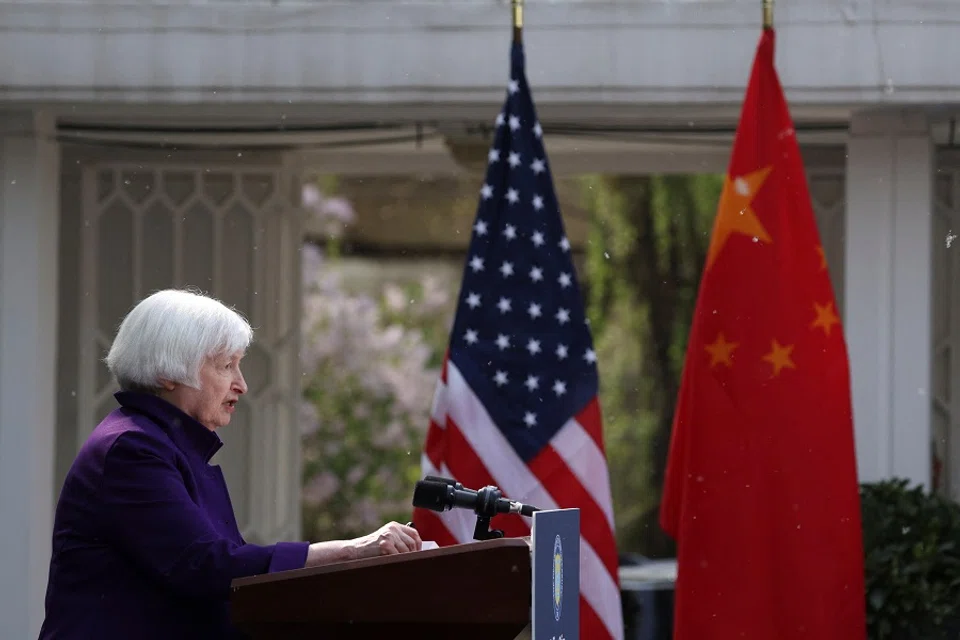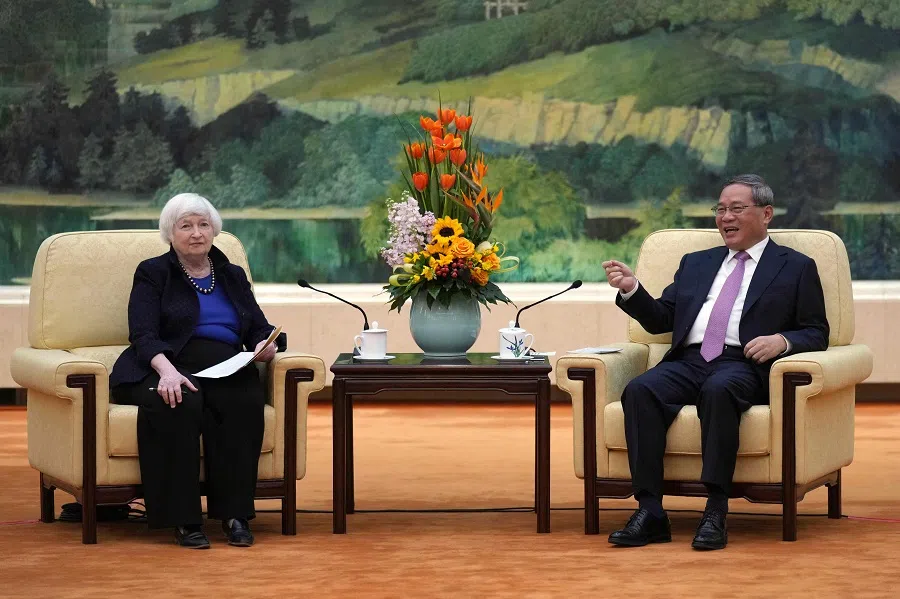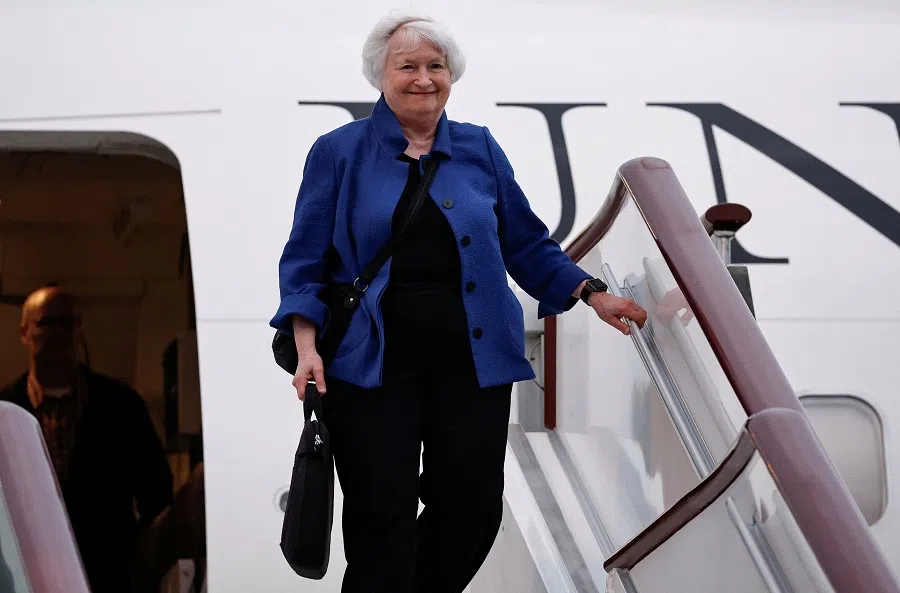US Treasury Secretary Janet Yellen's China visit yields some results
Despite heightened tension between China and the US, the two sides are maintaining communications at all levels. Lianhe Zaobao correspondent Yu Zeyuan notes that as long as the two countries remain in contact, the situation will not turn for the worse or spin out of control.

Against the backdrop of continuing China-US tensions, US Treasury Secretary Janet Yellen embarked on a six-day trip to China, arriving in Guangzhou on 4 April. As of 8 April, she has met with China's top officials including Premier Li Qiang, Vice-Premier He Lifeng, Finance Minister Lan Fo'an and the People's Bank of China governor Pan Gongsheng.
Relations on stable footing?
Based on the public statements from Yellen and the Chinese officials, the atmosphere of their meetings has been positive; at the very least, it is not as tense as the current China-US relations.
In her meeting with Li Qiang, Yellen stated that as the two largest economies in the world, the US and China should "responsibly manage our complex relationship" and show leadership in addressing pressing global challenges. Although both sides have more work to do, over the past year "we have put our bilateral relationship on more stable footing".
These statements are somewhat diplomatic in nature. In fact, even after Chinese President Xi Jinping and US President Joe Biden met at a bilateral summit in November 2023 in San Francisco, and subsequently shared a nearly two-hour-long call just before Yellen's visit to China, not many would believe that China-US relations is on more stable footing.
Around the time of Yellen's visit to China, the US did not reduce their rhetoric or actions against China. Militarily, a US general announced in Tokyo on 3 April that by the end of 2024, they would deploy a new medium-range missile launcher in the Asia-Pacific region that would be able to launch the Tomahawk missile with a range of more than 1,600 kilometres, as well as the new SM-6 interceptor missile.

Once this missile launcher is deployed, China's coastal cities in the east would be within range. At the same time, the US, Australia, Japan and the Philippines held joint naval and air drills in the South China Sea on 7 April. This is the first time that the four countries held a joint military exercise in the disputed waters of the South China Sea. The drills were clearly targeted at the sovereignty claims over the relevant areas by China, as well as a response to the recent heightened tensions between China and the Philippines in the South China Sea.
Have its cake and eat it too
Politically, the leaders of the US, Japan and the Philippines will hold a trilateral summit in Washington on 11 April, and the three countries evidently hope to strengthen security cooperation. A possible issue on the table would most likely be how to respond to China's "unilateral change of the status quo" in the South China Sea.
From China's viewpoint, be it the US-Australia-Japan-Philippines joint military exercise or the US-Japan-Philippines trilateral summit, these are all instances of the US leveraging its allies in support of the Philippines, and a move by the US to incite the Philippines to provoke China in the South China Sea.
In response, the Southern Theater Command of the People's Liberation Army declared on 7 April that it would conduct a joint air and naval combat patrol in the South China Sea, and claimed that "all military activities intended to sabotage the situation and create hotspots in the waters are well under control".
Economically, US trade representative Katherine Tai stated on 4 April in Brussels that China's economic growth and "non-market" policies would inflict severe economic and political damage on both the US and the European Union, and both sides should adopt appropriate "countermeasures" to collectively face the challenge brought on by China. The US government is also ready to continue pressuring the Netherlands to stop chipmaking equipment giant ASML from servicing some tools in China.
... can China also criticise the overcapacity issue of American enterprises such as Nvidia and its harm on China's chip industry? - Chinese we-media personalities

Before her visit to China, Yellen has expressed concern about China's overcapacity, especially in electric vehicles (EVs), solar panels and new energy products, and thinks that China's overcapacity is harming US businesses. She has expressed relevant concerns to Chinese officials and urged the Chinese side to rectify its unfair trade practices and ensure that US workers and businesses are treated fairly.
Hence, Chinese public opinion is not optimistic that Yellen's China visit will achieve anything. Some we-media "Big Vs" (大V, verified internet personalities) wrote that the US and Europe have been attacking China for the country's excessive emissions and its impact on the environment, and are now criticising China's overcapacity in EVs, solar panels and other new energy products and complaining about how it harms US businesses; so then, can China also criticise the overcapacity issue of American enterprises such as Nvidia and its harm on China's chip industry?
They asserted that while Yellen is an economist herself, now that she is treasury secretary, where she sits determines where she stands - she now holds double standards.
Other we-media also claimed that everybody knows the purpose of Yellen's visit to China: on the one hand, she wants China to buy US debt and help the US tide over inflation; on the other hand, she hopes to contain China's manufacturing sector and wants China to make economic concessions. They asserted that this is a classic example of the US wanting to have its cake and eat it too - how is it even possible?
... some we-media alleged that Yellen's down-to-earth posture in China and her deliberately having a meal with all eyes on her is an attempt at waging a colour revolution in China.
Maintaining contact at all levels
Some we-media even accused Yellen of waging a "colour revolution" for eating at a restaurant in Guangzhou. When Yellen disembarked the plane in Guangzhou, she looked like an amiable "granny next door" as she held a travel bag in one hand while slinging another over her shoulder. That night, she had dinner at a time-honoured local restaurant and skilfully wielded a pair of chopsticks, which won Chinese netizens' praise.

But some we-media alleged that Yellen's down-to-earth posture in China and her deliberately having a meal with all eyes on her is an attempt at waging a colour revolution in China.
Yellen ate at a Sichuan restaurant after arriving in Beijing on 7 April. Some netizens think that people are being overly sensitive for saying that Yellen was "waging a colour revolution" by having a meal in public.
State-affiliated WeChat official account Yu Yuan Tan Tian (玉渊潭天) said in an article that they welcome more US officials to try Chinese delicacies and experience traditional Chinese culture; and also hope that as US officials learn more about Chinese delicacies, their understanding of China can be deepened as well.
Based on China's official stance, Yellen's visit to China was quite successful. Xinhua reported that Li Qiang told Yellen that the Chinese side hopes the two countries will be partners rather than adversaries, with mutual respect, peaceful coexistence and win-win cooperation. He added that both sides should strengthen communication to jointly find ways to manage and resolve differences, so as to make China-US economic and trade cooperation stable, smooth and efficient.

On 3-4 April, Chinese and American militaries had a dialogue on the current maritime and air safety situation between both countries to ensure a reduction in military friction. Following Yellen's China visit, US Secretary of State Antony Blinken will also be visiting China. Indeed, high-level engagement and talks at all levels between China and the US are set to continue.
Regardless of the conflicts and disagreements between China and the US, as long as the higher-ups of both sides maintain contact, China-US relations will not spin out of control, even if they cannot be improved. From this perspective, Yellen's China visit is not futile after all.
This article was first published in Lianhe Zaobao as "耶伦访华会不会空手而归?".





